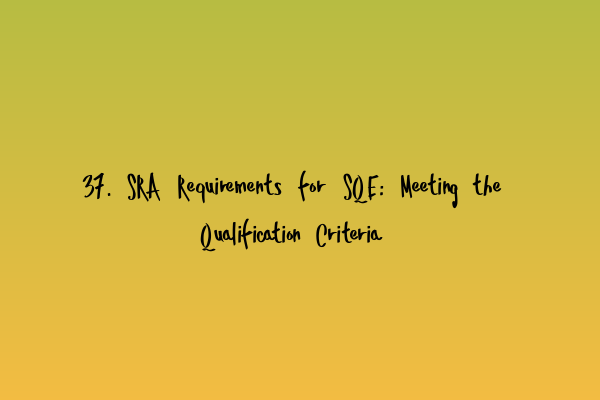37. SRA Requirements for SQE: Meeting the Qualification Criteria
Welcome to our blog series on the Solicitors Qualifying Exam (SQE)! In this post, we will be discussing the SRA requirements for meeting the qualification criteria of the SQE. If you’re planning on taking the SQE exams, it’s crucial to understand these requirements in order to successfully qualify as a solicitor. So let’s dive right in!
The Solicitors Regulation Authority (SRA) has set out specific requirements that candidates must meet in order to qualify as a solicitor through the SQE. These requirements encompass various aspects, including academic qualifications, work experience, and character and suitability. Let’s take a closer look at each of these requirements.
1. Academic Qualifications
The first requirement involves obtaining the necessary academic qualifications. To be eligible for the SQE, candidates must have a degree (or equivalent) in any subject from a recognized institution. It’s important to note that there are no specific subject requirements for the degree. Additionally, candidates must also have passed the English language requirement set by the SRA.
For those who do not hold a qualifying law degree, you will need to pass the SQE1 assessment which tests your knowledge and understanding of law.
If you’re unsure about the academic qualifications required for the SQE, it’s advisable to consult with an SQE preparation course provider who can guide you through the process and help you determine whether you meet the criteria.
2. Work Experience
In addition to academic qualifications, candidates are also required to gain a minimum of two years’ full-time (or equivalent) work experience. This work experience can be obtained before, during, or after completing the SQE assessments.
The SRA recognizes different types of work experience, including working as a paralegal, legal work outside of the UK, or work experience gained through a clinic or a virtual law firm. It’s important to note that the work experience must be legal in nature and related to the practice of law.
If you’re looking for guidance on gaining work experience, our SQE preparation course offers support and advice on finding relevant work placements and making the most of your experience.
3. Character and Suitability
The final requirement set by the SRA involves demonstrating good character and suitability. This requirement includes a thorough assessment of your character, reputation, and background to ensure that you possess the necessary qualities to be a trusted and competent solicitor.
As part of this requirement, candidates will be asked to disclose any criminal convictions, disciplinary findings, or other factors that might impact their suitability to practice law. It’s crucial to be honest and transparent during this process as any false or misleading information can have serious consequences.
Our SQE preparation course provides guidance and support on the character and suitability requirement, helping you navigate the process and ensure that you present yourself in the best possible light.
Conclusion
Meeting the qualification criteria set by the SRA is essential for successfully qualifying as a solicitor through the SQE. By understanding and fulfilling the academic qualifications, work experience, and character and suitability requirements, you can confidently pursue your goal of becoming a qualified solicitor.
If you’re preparing for the SQE exams, make sure to check out our articles on SQE 1 practice exam questions, SQE 1 practice mocks FLK1 FLK2, SQE 2 preparation courses, SQE 1 preparation courses, and SRA SQE exam dates for further information and support.
If you have any questions or need assistance with your SQE journey, our team at SQE Exam Law is here to help. Feel free to reach out to us for personalized guidance and support. Good luck with your SQE exams!
